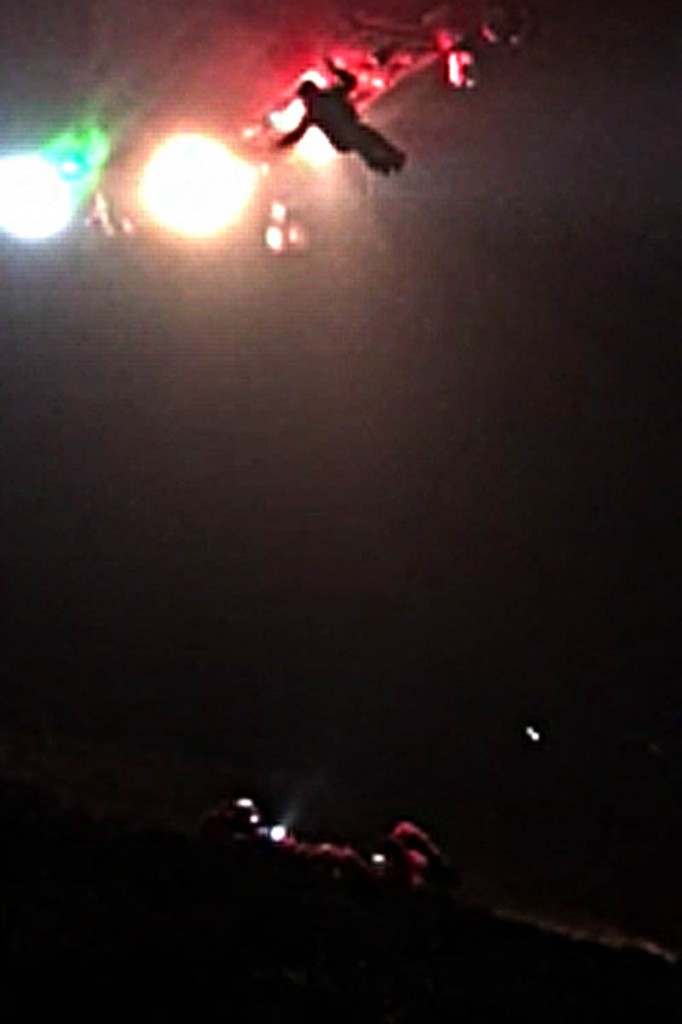Rescuers who went to the aid of a group of walkers on Cadair Idris said one of them, who became critically hypothermic, could have lost his life.
The decisions the group made in poor weather conditions also put the lives of all four of them in jeopardy.
A major operation involving 31 mountain rescuer was mounted to bring the four walkers to safety from the Snowdonia mountain.
Aberdyfi Search and Rescue Team was alerted about 3.45pm on Saturday to the plight of the group, near the summit of the 893m (2,930ft) peak.
A team spokesperson said: “The party, originally part of a larger group, had set out from Minffordd earlier in the day.
“The poor weather conditions meant that some of the group turned back before reaching the summit. The others pressed on despite poor visibility, strong winds, heavy rain and hailstorms, and while traversing the summit plateau one of the party started to succumb to hypothermia and was unable to continue. At this point the group called for assistance.”
As rescuers were putting together their plan, a team member who happened to be walking on the mountain came across the group. The PhoneFind system was used to pinpoint their location. The hypothermic walker was reported to be drifting in and out of consciousness.
The spokesperson said: “Immediate action by the lone Aberdyfi team member, who was not carrying team equipment but making do with his personal kit, helped protect the deteriorating male from the harsh weather on the summit as the rescue was initiated.
“The casualty’s three companions also began to deteriorate in the extremely poor conditions and the decision was made to direct the three back to the shelter at the summit where they would be out of the worst of the weather.
“Given the time of day, location prevailing conditions and potential complications in managing an unresponsive hypothermic patient, requests for assistance were made to South Snowdonia Search and Rescue Team and the HM Coastguard helicopter, Rescue 936.”
Weather conditions prevented the aircraft reach the site, but the crew airlifted a hasty part of rescuers part-way up the southern slopes of the mountain. A second hasty party, along with two stretcher parties made their way on foot up the Pony Path from Ty-nant.
Team members assessed the first casualty, preparing him for the stretcher party following on shortly behind. Meanwhile, after being given dry warm clothes, food and warm drinks, the three others were collected from the summit hut and reunited with the first casualty for the journey off the mountain.
The spokesperson said: “Moving faster than the stretcher, the summit-hut party emerged from the cloudbase first and this group was transported down the rest of the way by Rescue 936. The helicopter returned to pick up the stretcher party, now stopped as the casualty was in an increasingly critical condition. Some skilful flying meant that the stretcher could be winched onboard and the casualty was flown to Ysbyty Gwynedd for further assessment and treatment.”
The incident ended at 1am on Sunday. The rescue involved 31 volunteer team members, who put in a total of 270 hours.
The spokesperson added: “Our thanks again to South Snowdonia Search and Rescue Team and HM Coastguard Rescue 936 and crew from Caernarfon.”

SH
15 February 2022Well done to the rescue teams. Hopefully lessons learned from those who carried on.
Marty
16 February 2022Yet another tragedy averted by the tremendous work of the rescue teams. Going up a mountain like that in those conditions was foolhardy to say the least and they probably owe the lives to the dedication of the rescuers.
Roger Devey
16 February 2022Send them the bill for the fuel for the helicopter, as it's our taxes that pay for that. And a very large donation to the rescue team.
Old man of the hills
20 February 2022@Marty " Going up a mountain like that in those conditions was foolhardy..." is such a sweeping and judgemental statement. I was out on the hill early that day. It was a bit harsh, but I'm a WML and ex-MRT member. Was I also fool hardy?
James
20 February 2022"The foundation for most accidents (including getting lost, exposure and so on) is laid before the party starts out. The most common basic causes are over ambition; lack of appreciation of weather conditions; insufficient navigational skill, and lack of foresight.
Of all planning faults, over ambition is the most dangerous. An expedition should be what one is capable of doing, not what one would like to be capable of doing, and there is often a vast gulf between the former and the latter.”
John Duff, BEM – Aberdeenshire Mountain Rescue